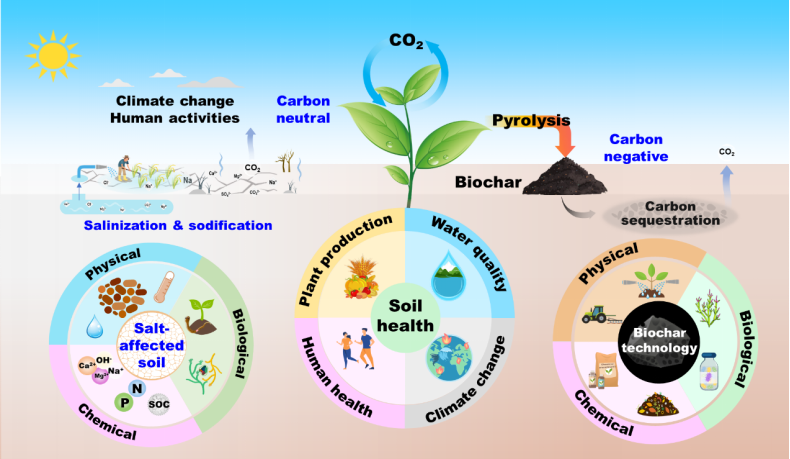Biochar: A Sustainable Negative Carbon Tool for Improving Saline Soil Health
The team of Professor Hao Zheng of Ocean University of China and Professor Baoshan Xing of the University of Massachusetts published a report entitled "Biochar as a sustainable tool for improving the health of salt-affected soil; 2023, 1(3): 100033)". As a carbon-negative tool, biochar can effectively improve the physical, chemical and biological health of saline soil, and can realize green improvement and sustainable use management of saline soil. This review deepens the scientific understanding of the mechanism of biochar in saline soil improvement, and provides a theoretical basis for the development of functionalized biochar materials and technologies suitable for healthy restoration of saline soil.
Soil physical health indexes mainly include texture structure, bulk density, porosity, moisture content and temperature. Soil chemical health indicators include salinity, pH, cation exchange, soil organic carbon, redox characteristics and nutrient content. Quantitative assessments of soil health are currently dominated by these chemical indicators, which account for at least 40% of the assessment indicators used in 90% of soil health assessment frameworks. Meta-analysis showed that biochar could significantly improve the physical and chemical health of saline soil by improving aggregate stability (15.0~34.9%), porosity (8.9%), water retention capacity (7.8~18.2%), cation exchange (21.1%), organic carbon content (63.1%) and nutrient availability (31.3~39.9%), reducing bulk density (6.0%) and alleviating salt stress.
Soil organisms respond more quickly to soil management measures or changes in the external environment, so biological indicators are more suitable for the prediction and assessment of soil health than physical and chemical indicators. After biochar application, the biological health of saline soil can be significantly improved, mainly manifested in the increase of microbial biomass (7.1~25.8%), the change of community structure, and the increase of enzyme activity (20.2~68.9%).
Demonstrating plant responses to biochar application can contribute to the understanding of improved saline soil health in terms of soil fertility, quality and primary productivity. Studies have shown that biochar can effectively improve the salinity tolerance and drought resistance of plants in salinized soil by regulating Na+/K+ homeostasis in plant cells, reducing oxidative damage and enhancing plant photosynthesis.
Screening suitable physical, chemical and biological indicators is the basis for saline soil health assessment. Screening and monitoring new indicators that can reflect the function of ecological services and developing new assessment methods are the core tasks of assessing the saline-alkali soil health of biochar improvement. In particular, in the era of carbon neutrality, indicators related to the carbon sink function of saline soils should be considered, especially the inorganic carbon content in saline soils in arid areas, or microbial residual carbon related to microbial carbon sequestration function. Future research should focus on the multifunctional health evaluation of saline soil after biochar application, quantify the relationship between soil health level and soil function, and establish a comprehensive saline soil health assessment framework to better guide the application of biochar and the sustainable management of saline soil.
Original link: https://doi.org/10.1016/j.seh.2023.100033

